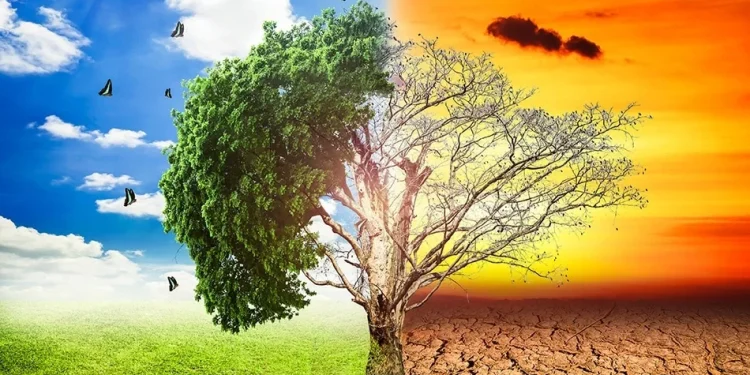By Hassan Osman Kargbo
Sierra Leone, a small West African nation with a rich natural environment, is facing significant challenges due to Climate Change. The interplay between its geographical vulnerabilities, socio-economic conditions, and climate impacts presents a multifaceted crisis that demands urgent attention and action.
Vulnerability and Exposure
Sierra Leone’s climate vulnerability is exacerbated by its geographical location. The country experiences a tropical climate, with distinct wet and dry seasons. However, climate change is altering these patterns, leading to increased rainfall variability, rising temperatures, and more frequent extreme weather events. Coastal areas, where a large portion of the population resides, are particularly susceptible to sea-level rise and flooding, threatening livelihoods and displacing communities.
Moreover, Sierra Leone has a history of environmental degradation, including deforestation and soil erosion, which intensifies the impact of climate change. The loss of forest cover, driven by agricultural expansion, logging, and mining, undermines the ecosystem’s ability to regulate the climate and protect against flooding. This degradation not only impacts biodiversity but also reduces the resilience of communities that depend on natural resources for their livelihoods.
Economic Implications
The economic repercussions of climate change in Sierra Leone are profound. Agriculture, which employs a significant portion of the population, is highly sensitive to climate variability. Changes in rainfall patterns and increased temperatures can lead to reduced crop yields, threatening food security and the livelihoods of farmers. The country has already witnessed shifts in crop productivity, particularly for staples like rice and cassava, which could exacerbate poverty and malnutrition.
Furthermore, Sierra Leone’s reliance on mining and resource extraction makes it vulnerable to climate-related disruptions. As weather patterns become more erratic, operational challenges in these sectors may arise, impacting national revenue and economic stability. The fishing industry, another critical sector, is also at risk due to ocean warming and acidification, which affect fish stocks and coastal communities that depend on fishing for their sustenance and income.
Health and Social Challenges
The health implications of climate change are increasingly concerning. Rising temperatures and altered rainfall patterns can facilitate the spread of diseases, such as malaria and cholera, particularly in vulnerable populations with limited access to healthcare. Poor infrastructure and sanitation exacerbate these health risks, making it imperative for the government to address both climate and public health challenges simultaneously.
Socially, climate change can exacerbate existing inequalities. Marginalized communities, including women and rural populations, often bear the brunt of climate impacts due to limited access to resources and decision-making power. Addressing these disparities is crucial for building resilience and ensuring equitable adaptation strategies.
Policy and Adaptation Efforts
Recognizing the severity of the climate crisis, the Sierra Leonean government has begun to take steps toward adaptation and mitigation. The country’s National Climate Change Policy outlines strategies to enhance resilience, promote sustainable development, and engage communities in climate action. However, implementation remains a challenge due to limited resources, institutional capacity, and coordination among stakeholders.
International support is vital for bolstering Sierra Leone’s climate resilience. Partnerships with NGOs, international organizations, and other countries can provide technical assistance, funding, and capacity-building initiatives to enhance local adaptation efforts. Innovative solutions, such as climate-smart agriculture and sustainable forestry practices, can help communities adapt while promoting environmental conservation.
In conclusion, climate change poses a multifaceted threat to Sierra Leone, impacting its economy, health, and social fabric. To combat these challenges, a concerted effort involving government, civil society, and international partners is essential. Building resilience against climate change requires not only addressing immediate impacts but also fostering sustainable development and reducing environmental degradation. As Sierra Leone navigates this complex landscape, prioritizing climate action will be crucial for safeguarding the future of its people and the environment.












